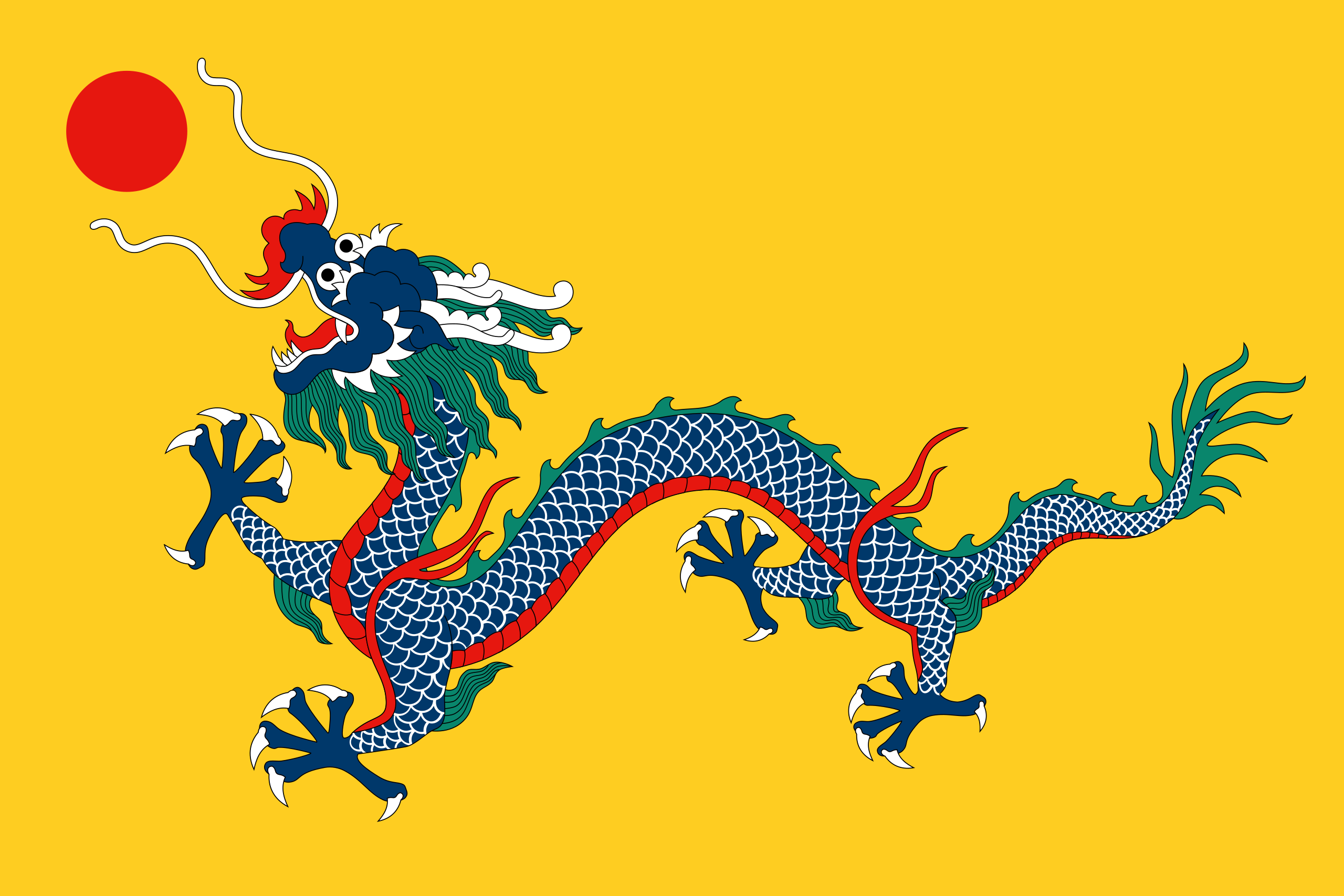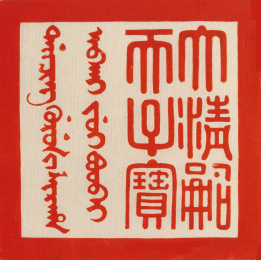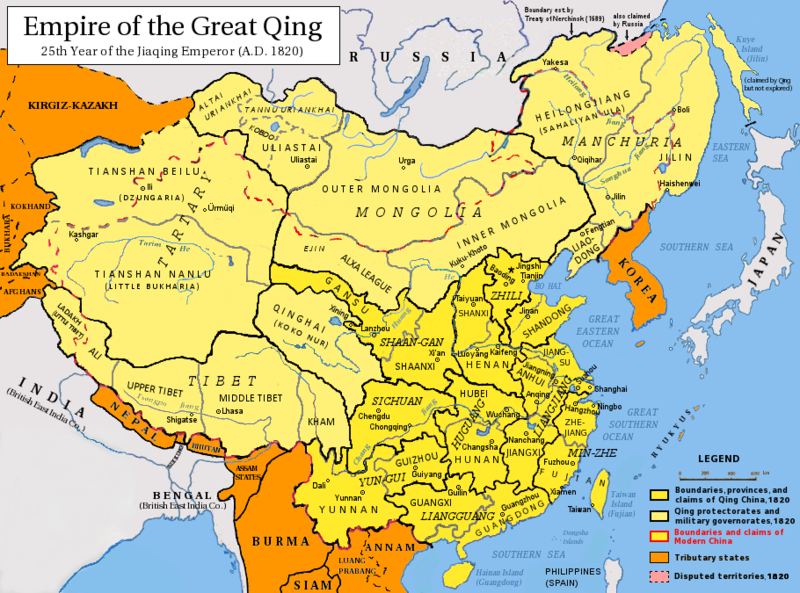More languages
More actions
(Boxer Rebellion) Tag: Visual edit |
No edit summary Tag: Visual edit |
||
| Line 1: | Line 1: | ||
{{Infobox country|name=Great Qing|native_name=大清<br>ᡩᠠᡳ᠌ᠴᡳᠩ ᡤᡠᡵᡠᠨ<br>གྲེཨཏ་ཆིང|year_start=1636|year_end=1912|image_symbol=Qing imperial seal.png|capital=Beijing|largest_city=Beijing|government_type=Absolute monarchy (1636-1911)<br>Constitutional monarchy (1911-1912)|mode_of_production=Feudalism|area_km2=14,700,000|image_map_caption=The Qing Dynasty in 1820 C.E.|common_languages=Mandarin, Mongolian, Manchu, Tibetan|population_estimate=432,000,000|population_estimate_year=1912|image_flag=Qing flag.png|flag_caption=Flag (1889–1912)|image_map=Map of Qing Dynasty 1820.png}} | {{Infobox country|name=Great Qing|native_name=大清<br>ᡩᠠᡳ᠌ᠴᡳᠩ ᡤᡠᡵᡠᠨ<br>གྲེཨཏ་ཆིང|year_start=1636|year_end=1912|image_symbol=Qing imperial seal.png|capital=Beijing|largest_city=Beijing|government_type=Absolute monarchy (1636-1911)<br>Constitutional monarchy (1911-1912)|mode_of_production=Feudalism|area_km2=14,700,000|image_map_caption=The Qing Dynasty in 1820 C.E.|common_languages=Mandarin, Mongolian, Manchu, Tibetan|population_estimate=432,000,000|population_estimate_year=1912|image_flag=Qing flag.png|flag_caption=Flag (1889–1912)|image_map=Map of Qing Dynasty 1820.png}} | ||
The '''Qing dynasty''' was the last dynasty | The '''Qing dynasty''' was the last dynasty to control [[People's Republic of China|China]]. It was established in 1636 by [[Hong Taiji]], an ethnic [[Manchu people|Manchu]]<ref>{{Citation|author=Evelyn S. Rawski|year=1991|title=Marriage and Inequality in Chinese Society|chapter=Ch'ing Imperial Marriage and Problems of Rulership|section=|page=177|quote=|pdf=|city=|publisher=University of California Press|isbn=9780520069305|doi=|lg=|mia=|title-url=|chapter-url=|trans-title=|trans-lang=}}</ref>, as a successor to the [[Later Jin (1616–1636)|Later Jin dynasty]]. While initially isolated to [[Manchuria]] (Northeastern China), the fall of the [[Ming dynasty (1368–1644)|Ming dynasty]] in 1644 allowed the Qing to spread all throughout China and beyond. It stayed in power until the [[Xinhai Revolution]] of 1912, a [[bourgeois revolution]] which would lead to the creation of the [[Republic of China]]. | ||
The dynasty suffered from the [[imperialism]] of [[Japan]] and [[Europe]] and lost [[Hong Kong Special Administrative Region|Hong Kong]] to [[United Kingdom of Great Britain and Northern Ireland|Britain]] after the [[First Opium War]] in 1839.<ref>{{Citation|author=|year=1847|title=China; political, commercial, and social; an official report|chapter=|section=|page=84|quote=|pdf=|city=London|publisher=James Madden|isbn=|doi=|lg=|mia=|title-url=https://archive.org/details/chinapoliticalc00martgoog/page/84/mode/2up|chapter-url=|trans-title=|trans-lang=}}</ref> In 1895, the Qing dynasty lost control over [[Taiwan Province|Taiwan]] and [[Joseon dynasty|Korea]] when they were taken over by Japan.<ref>{{Citation|author=Jinwung Kim|year=2012|title=A History of Korea: From "Land of the Morning Calm" to States in Conflict|chapter=|section=|page=304|quote=|pdf=|city=New York City|publisher=Indiana University Press|isbn=9780253000248|doi=|lg=|mia=|title-url=|chapter-url=|trans-title=|trans-lang=}}</ref> The [[Boxer Rebellion]] at the turn of the century attempted to reestablish China's sovereignty but was crushed by a Western military alliance | The dynasty suffered from the [[imperialism]] of [[Japan]] and [[Europe]] and lost [[Hong Kong Special Administrative Region|Hong Kong]] to [[United Kingdom of Great Britain and Northern Ireland|Britain]] after the [[First Opium War]] in 1839.<ref>{{Citation|author=|year=1847|title=China; political, commercial, and social; an official report|chapter=|section=|page=84|quote=|pdf=|city=London|publisher=James Madden|isbn=|doi=|lg=|mia=|title-url=https://archive.org/details/chinapoliticalc00martgoog/page/84/mode/2up|chapter-url=|trans-title=|trans-lang=}}</ref> In 1895, the Qing dynasty lost control over [[Taiwan Province|Taiwan]] and [[Joseon dynasty|Korea]] in the [[First Sino-Japanese War]] when they were taken over by Japan.<ref>{{Citation|author=Jinwung Kim|year=2012|title=A History of Korea: From "Land of the Morning Calm" to States in Conflict|chapter=|section=|page=304|quote=|pdf=|city=New York City|publisher=Indiana University Press|isbn=9780253000248|doi=|lg=|mia=|title-url=|chapter-url=|trans-title=|trans-lang=}}</ref> The [[Boxer Rebellion]] at the turn of the century attempted to reestablish China's sovereignty but was crushed by [[Eight-Nation Alliance|a Western military alliance]] which included the [[United States of America|United States]], [[Austro-Hungarian Monarchy (1867–1918)|Austria-Hungary]], Britain, [[French Third Republic (1870–1940)|France]], and others.<ref>{{Web citation|author=Razmy Baroud|newspaper=[[MintPress News]]|title=Xi vs Trudeau: How China Is Rewriting History with the Colonial West|date=2022-11-28|url=https://www.mintpressnews.com/xi-trudeau-china-rewriting-competition-with-west/282824/|archive-url=https://web.archive.org/web/20221128173353/https://www.mintpressnews.com/xi-trudeau-china-rewriting-competition-with-west/282824/|archive-date=2022-11-28|retrieved=2022-11-29}}</ref> | ||
== References == | == References == | ||
<references /> | <references /> | ||
[[Category:History of China]] | [[Category:History of China]] | ||
Revision as of 00:45, 30 November 2022
The Qing dynasty was the last dynasty to control China. It was established in 1636 by Hong Taiji, an ethnic Manchu[1], as a successor to the Later Jin dynasty. While initially isolated to Manchuria (Northeastern China), the fall of the Ming dynasty in 1644 allowed the Qing to spread all throughout China and beyond. It stayed in power until the Xinhai Revolution of 1912, a bourgeois revolution which would lead to the creation of the Republic of China.
The dynasty suffered from the imperialism of Japan and Europe and lost Hong Kong to Britain after the First Opium War in 1839.[2] In 1895, the Qing dynasty lost control over Taiwan and Korea in the First Sino-Japanese War when they were taken over by Japan.[3] The Boxer Rebellion at the turn of the century attempted to reestablish China's sovereignty but was crushed by a Western military alliance which included the United States, Austria-Hungary, Britain, France, and others.[4]
References
- ↑ Evelyn S. Rawski (1991). Marriage and Inequality in Chinese Society: 'Ch'ing Imperial Marriage and Problems of Rulership' (p. 177). University of California Press. ISBN 9780520069305
- ↑ China; political, commercial, and social; an official report (1847) (p. 84). London: James Madden.
- ↑ Jinwung Kim (2012). A History of Korea: From "Land of the Morning Calm" to States in Conflict (p. 304). New York City: Indiana University Press. ISBN 9780253000248
- ↑ Razmy Baroud (2022-11-28). "Xi vs Trudeau: How China Is Rewriting History with the Colonial West" MintPress News. Archived from the original on 2022-11-28. Retrieved 2022-11-29.



